| Listing 1 - 9 of 9 |
Sort by
|
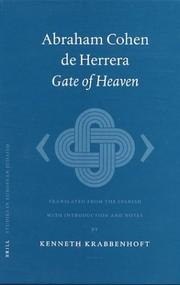
ISBN: 9789004493841 9789004122536 Year: 2002 Publisher: Leiden; Boston : BRILL
Abstract | Keywords | Export | Availability | Bookmark
 Loading...
Loading...Choose an application
- Reference Manager
- EndNote
- RefWorks (Direct export to RefWorks)
With the publication of Abraham Cohen de Herrera's Gate of Heaven , a widely influential work of Jewish mysticism is available for the first time in an unabridged, annotated English edition. In this work, originally written in Spanish for the marrano community of Amsterdam, Herrera (d. 1635) follows the syncretic model of Marsilio Ficino and Pico della Mirandola in reconciling the teachings of the Sefer Yezirah , the Zohar , Moses Cordovero, Isaac Lurian and the Lurianic school (in particular Israel Sarug), with Aristotelian, Platonic, and Neoplatonic metaphysics, medieval Islamic and Jewish theology, and Scholasticism. This thorough synthesis explains the work's appeal to philosophers like Spinoza, Leibniz, Henry More, Hegel, and Jacob Bruckner.
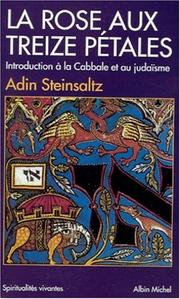
ISBN: 9782226133205 2226133208 Year: 2002 Publisher: [Paris] : Albin Michel,
Abstract | Keywords | Export | Availability | Bookmark
 Loading...
Loading...Choose an application
- Reference Manager
- EndNote
- RefWorks (Direct export to RefWorks)
Jetant un regard nouveau sur le rôle de la foi, sur la pratique juive et sur la quête de Dieu, Adin Steinsaltz élabore une synthèse théologique qui permet d'accéder aux sources mêmes du monde juif.

ISBN: 0691090688 0691119805 0691187738 Year: 2002 Publisher: Princeton University Press
Abstract | Keywords | Export | Availability | Bookmark
 Loading...
Loading...Choose an application
- Reference Manager
- EndNote
- RefWorks (Direct export to RefWorks)
Cabala. --- Femininity of God --- Biblical teaching. --- History of doctrines.

ISBN: 2743609826 9782743609825 Year: 2002 Publisher: Paris : Payot & Rivages,
Abstract | Keywords | Export | Availability | Bookmark
 Loading...
Loading...Choose an application
- Reference Manager
- EndNote
- RefWorks (Direct export to RefWorks)
Cabala --- Kabbale --- Ouvrages avant 1800 --- Sefer Yeẓirah.
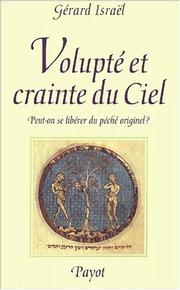
ISBN: 2228896519 9782228896511 Year: 2002 Publisher: Paris : Payot,
Abstract | Keywords | Export | Availability | Bookmark
 Loading...
Loading...Choose an application
- Reference Manager
- EndNote
- RefWorks (Direct export to RefWorks)
Sin, Original. --- Cabala and Christianity --- Péché originel --- Kabbale et christianisme --- Talmud --- Péché originel --- Talmud.
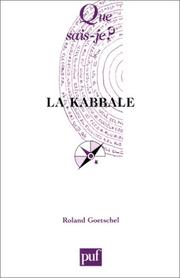
ISBN: 2130526837 9782130526834 Year: 2002 Volume: 1105 Publisher: Paris Presses universitaires de France
Abstract | Keywords | Export | Availability | Bookmark
 Loading...
Loading...Choose an application
- Reference Manager
- EndNote
- RefWorks (Direct export to RefWorks)
296*41 --- Kabbala --- 296*41 Kabbala --- Désherbage --- Deselectie --- Cabala --- Kabbale --- Esoteric sciences --- Jewish religion
Book
ISBN: 0911437983 Year: 2002 Publisher: Lancaster, Calif. : Labyrinthos,
Abstract | Keywords | Export | Availability | Bookmark
 Loading...
Loading...Choose an application
- Reference Manager
- EndNote
- RefWorks (Direct export to RefWorks)
Cabala --- Ecstasy (Judaism) --- Kabbale --- Extase --- History. --- Histoire --- Judaïsme --- Abulafia, Abraham ben Samuel,
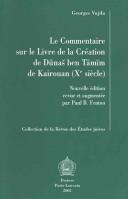
ISBN: 9042910925 2877236072 9789042910928 Year: 2002 Publisher: Louvain Paris Peeters
Abstract | Keywords | Export | Availability | Bookmark
 Loading...
Loading...Choose an application
- Reference Manager
- EndNote
- RefWorks (Direct export to RefWorks)
Considéré comme le premier essai cosmologique de la pensée hébraïque, le 'Livre de la Création' est un des textes les plus énigmatiques de la littérature juive. L'obscurité de son discours permit aux philosophes, et plus tard aux kabbalistes, d'y déceler leurs propres sytèmes spéculatifs. L'ouvrage de Dunas ben Tamim (Xe siècle) est non seulement un des premiers commentaires sur ce livre mystérieux, mais c'est aussi un des plus anciens monuments de la pensée juive médiévale. Rédigé en langue arabe et issu de la prestigieuse école néoplatonicienne de Kairouan dirigée par Isaac Israéli, ce commentaire représente une des prémices de la longue tradition intellectuelle d'expression judéo-arabe.Après avoir consacré à ce document sa thèse complémentaire, soutenue en 1946 mais demeurée inédite, l'éminent orientaliste, Georges Vajda (1908-1981), poursuivit ses recherches sur le commentaire kairouanais pendant plus de quarante ans. De ce travail pionnier, dont la minutieuse analyse s'attache à replacer chaque composante conceptuelle dans l'histoire de la philosophie gréco-arabe, des résultats partiels ont paru jusque-là, dispersés dans plusieurs périodiques scientifiques.Dans la présente publication, Paul B. Fenton, a réuni ces études majeures de son maître, en mettant à jour la documentation et l'annotation. Il y donne pour la première fois la traduction intégrale du commentaire de Dunas ben Tamim. Celle-ci est basée sur l'édition critique de l'ensemble des versions hébraïques médiévales, ainsi que sur l'original arabe, découvert en partie postérieurement à l'étude de Vajda, parmi les manuscrits de la genizah du Caire.L'ouvrage est accompagné d'une introduction, d'une mise à jour bibliographique, des index, et de l'édition critique de la traduction hébraïque de Moïse b. Joseph de Lucène (XIII siècle).
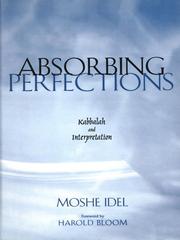
ISBN: 1281734861 9786611734862 0300135076 9780300135077 9781281734860 0300083793 9780300083798 Year: 2002 Publisher: New Haven Yale University Press
Abstract | Keywords | Export | Availability | Bookmark
 Loading...
Loading...Choose an application
- Reference Manager
- EndNote
- RefWorks (Direct export to RefWorks)
In this wide-ranging discussion of Kabbalah-from the mystical trends of medieval Judaism to modern Hasidism-one of the world's foremost scholars considers different visions of the nature of the sacred text and of the methods to interpret it. Moshe Idel takes as a starting point the fact that the postbiblical Jewish world lost its geographical center with the destruction of the temple and so was left with a textual center, the Holy Book. Idel argues that a text-oriented religion produced language-centered forms of mysticism.Against this background, the author demonstrates how various Jewish mystics amplified the content of the Scriptures so as to include everything: the world, or God, for example. Thus the text becomes a major realm for contemplation, and the interpretation of the text frequently becomes an encounter with the deepest realms of reality. Idel delineates the particular hermeneutics belonging to Jewish mysticism, investigates the progressive filling of the text with secrets and hidden levels of meaning, and considers in detail the various interpretive strategies needed to decodify the arcane dimensions of the text.
Cabala --- History. --- Bible. --- Chumash --- Five Books of Moses --- Ḥamishah ḥumshe Torah --- Ḥumash --- Kitāb-i Muqqadas --- Mose Ogyŏng (Book of the Old Testament) --- Pentateuch --- Pi︠a︡toknizhīe Moiseevo --- Sefer Ḥamishah ḥumshe Torah --- Tawrāh --- Torà (Pentateuch) --- Torah (Pentateuch) --- Tʻoris xutʻcigneuli --- Ureta --- תורה --- Haftarot --- Criticism, interpretation, etc., Jewish. --- Kabbale --- Histoire
| Listing 1 - 9 of 9 |
Sort by
|

 Search
Search Feedback
Feedback About UniCat
About UniCat  Help
Help News
News